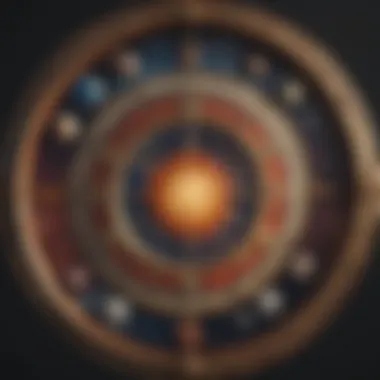Astrological Insights on Rekindling Lost Love


Intro
Understanding the dynamics of romantic relationships often leads individuals to seek answers beyond the tangible. The intriguing realm of astrology can provide insights that resonate with personal experiences. This article explores how astrological principles can aid in the journey of rekindling lost love.
Astrology is not merely about predicting the future; it is a diagnostic tool. It assesses personality traits, emotional tendencies, and compatibility based on celestial influences. For those wondering if they can win back a previous partner, understanding one’s own zodiac sign can offer illuminating perspectives.
Zodiac Sign Overview
Exploring the energies of each zodiac sign lays the groundwork for comprehending individual behaviors in love.
General Traits
Each zodiac sign possesses distinct personality traits. For instance, Aries often showcases assertiveness and passion, while Cancer leans towards nurturing and sensitivity. Understanding these traits can offer a roadmap to navigate one's emotional landscape.
Element and Modality
The zodiac signs are categorized by four elements: Fire, Earth, Air, and Water; and three modalities: Cardinal, Fixed, and Mutable. Fire signs like Leo are known for enthusiasm and creativity, whereas Earth signs like Taurus are more grounded and practical. This classification provides insight into how individuals may approach relationships.
Strengths and Weaknesses
Acknowledging strengths and weaknesses is vital. Each sign has unique attributes that can enhance relationships, but also vulnerabilities that may lead to interpersonal struggles. For example, Gemini's adaptability is a strength, while their indecision can cause conflict.
Understanding these nuances prepares individuals to make informed decisions about rekindling relationships.
Detailed Horoscope Analysis
A nuanced approach to analyzing one’s horoscope can uncover profound insights relevant to love.
Daily Horoscope Breakdown
Daily horoscopes provide snapshots of influences affecting emotions and decisions on a given day. They help individuals recognize patterns that may affect their romantic pursuits.
Weekly and Monthly Predictions
Weekly and monthly predictions can reveal trends and upcoming challenges, particularly in love. Tracking these predictions can prepare you for moments of connection or confrontation with a loved one.
Key Planetary Influences
Planetary movements, especially those of Venus and Mars, have significant impacts on love. When Venus transits through relational signs, it can amplify feelings of love and affection. Conversely, retrogrades of these planets may lead to misunderstandings or clarity around past relationships.
Astrology for Personal Growth
Astrology is more than a guide; it is an avenue for personal growth.
Understanding Birth Charts
A birth chart is a personalized celestial map that reflects an individual's emotional and spiritual makeup. By understanding your own chart and that of your partner, you can identify potential compatibility and areas for growth.
Tips for Embracing One's Zodiac Traits
Embracing your zodiac traits can enhance your emotional intelligence. Familiarizing oneself with personal characteristics allows for better self-awareness and an improved relationship dynamic. Consider journaling about your feelings and thoughts based on your sign’s traits.
Astrological Practices to Enhance Life
Engaging in astrological practices, such as meditation during specific lunar phases or setting intentions on new moons, can help in healing and personal reflection. Connect with supportive communities or online forums for shared experiences, insights, and guidance.


Understanding the Role of Astrology in Relationships
Astrology plays a significant role in the lives of many, particularly when it comes to understanding relationships. This article examines how astrological insights can influence romantic entanglements, especially regarding rekindling love. By studying astrological compatibility and celestial events, one can gain insights into personal relationships. This knowledge is not merely about predicting the future but rather about understanding the dynamic forces at play.
Astrology can offer a detailed analysis of relationship dynamics. Understanding your astrological chart and that of your partner can highlight strengths and weaknesses in the relationship. This knowledge fosters a better understanding of why certain conflicts arise and how to address them. In this light, readers will find that astrology is not just a tool for prediction but also a means for personal growth and understanding.
Defining Astrology and Its Significance
Astrology refers to the study of celestial bodies, like planets and stars, and their influence on human affairs. It encompasses various systems, including Western and Vedic astrology. The primary goal of astrology is to uncover the patterns in life that correspond to the movements of celestial bodies. Astrology is significant for those looking to understand relationships as it offers guidance on compatibility and emotional responses.
Astrology involves personal birth charts, which include the positions of planets at the time of one’s birth. Each planet represents different aspects of personality and life experiences. For instance, Venus is linked to love and relationships, while Mars relates to passion and drive. Knowing these influences can markedly inform relationship dynamics, guiding individuals in their interactions and decisions.
Astrological Compatibility: A Brief Overview
Astrological compatibility examines the interactions between two birth charts to understand how partners relate to each other. By assessing each person's astrological signs, enthusiasts can determine the strengths and challenges of their connection. Compatibility is often determined through examining sun signs, moon signs, and rising signs, which can reveal essential insights into emotional and intellectual harmony.
Important Elements of Astrological Compatibility:
- Sun Signs: Represent one's core essence and major traits.
- Moon Signs: Reflect emotional needs and subconscious responses.
- Rising Signs: Indicate how one presents themselves to the world.
Astrological compatibility provides a framework for understanding relationship dynamics. In moments of conflict, awareness of astrological influences can aid reconciliation, allowing individuals to approach their challenges with a more informed perspective. Understanding these elements can lead to a more harmonious relationship, offering the potential for rekindling lost love.
Astrology is not about destiny but rather about potential. It gives insights that help individuals make informed decisions about love and relationships.
Through examining one’s astrological indicators, individuals can gain clarity on their relationship goals and emotional patterns. This information opens pathways for self-improvement and deeper connection with partners, ultimately guiding one towards more fulfilling romantic experiences.
Common Astrological Indicators of Love and Relationships
Astrology plays a significant role in understanding the emotional and relational dynamics between individuals. The positions and movements of celestial bodies can offer insights into interpersonal connections, highlighting patterns that may influence love and relationships. This particular section outlines critical astrological indicators that pertain specifically to romance. By recognizing these indicators, readers can navigate their emotional landscapes more effectively and make informed decisions regarding their love lives.
Key Planets Governing Love
In astrology, certain planets are viewed as crucial in shaping romantic interactions. The most notable among these are Venus and Mars. Venus specifically relates to love, beauty, and attraction. It signifies how one expresses affection, desires harmony, and seeks companionship. Understanding the placement of Venus in one’s chart can reveal a lot about how an individual approaches relationships.
Mars, on the other hand, is associated with passion, desire, and assertiveness. It represents the more dynamic aspects of love, such as the pursuit of a partner and the expression of intense emotions. Analyzing how Mars influences your chart can provide insight into your romantic tendencies, including how you assert your needs in relationships and how you engage with desire.
Influence of Venus and Mars
Venus and Mars operate in a complementary fashion, encapsulating the full spectrum of romantic energy. When Venus is positively positioned, it fosters a sense of peace and attraction. Relationships may flourish under these influences. Conversely, challenging aspects involving Venus might indicate bouts of jealousy or misunderstandings.
For Mars, its influence might create an urge to act or pursue. When one experiences a strong Mars influence, they may find themselves driven to reconnect with a former partner, as the desire rekindles. However, the energy of Mars can also lead to impulsiveness, suggesting the need for caution in how one approaches potential reconciliations.
Role of Ascendant and Moon Signs
The Ascendant, or rising sign, is integral in shaping a person’s outward personality and how they present themselves to the world. This sign can greatly influence relationship patterns as it determines initial attraction and first impressions. The Ascendant reveals traits that potential partners may find appealing, or conversely, trigger conflicts.
Moon signs delve into deeper emotional needs and instincts. They represent how individuals handle feelings and express vulnerability. Understanding one’s own Moon sign, as well as that of a partner, offers insight into the emotional compatibility present within a relationship. This can be particularly useful when seeking clarity around previous partnerships and the potential for future reconciliation.
In summary, recognizing the positions of key planets and signs serves as a groundwork for understanding astrological indicators relevant to love. This knowledge allows individuals to reflect on their emotional responses and guides them in their pursuit of love, whether that means moving forward or attempting to reconnect.
Understanding these astrological components can foster a deeper connection with oneself and inform choices in relationships.
Astrological Techniques for Assessing Relationship Dynamics
Astrological techniques offer valuable frameworks for analyzing interpersonal relationships. By examining celestial influences, individuals can gain insights into the dynamics of their partnerships. The exploration of astrological methods—such as synastry, composite charts, and transits—provides tools to understand compatibility, the essence of a relationship, and the timing of events.


These techniques help individuals assess the undercurrents in their relationships. Recognizing astrological factors can lead to deeper self-awareness and better decision-making regarding love. While astrology cannot dictate the outcomes, it offers perspectives that can illuminate paths forward.
Synastry: Comparing Birth Charts
Synastry is the study of how two birth charts interact with one another. This technique assesses compatibility by analyzing aspects formed between the planets in both charts. By looking at how the positions of the planets at the time of birth relate to one another, one can uncover strengths and challenges in a relationship.
Key elements to assess in synastry include:
- Sun and Moon Aspects: These are vital for emotional connection. Harmonious aspects can show mutual understanding, while challenging aspects may indicate conflicts.
- Venus and Mars Relations: Venus represents love and attraction, while Mars signifies passion and drive. The interplay of these planets can reveal romantic dynamics.
- Saturn’s Role: Saturn can indicate lessons to be learned within the relationship. Hard aspects may suggest more difficult lessons, while soft aspects can indicate stability and long-term potential.
Understanding synastry allows individuals to identify areas for growth and cooperation. It highlights how personal planets interact, shedding light on both emotional responses and motivations.
Composite Charts: Understanding the Relationship Entity
Composite charts create a new chart representing the relationship itself. This method combines the birth dates of both partners to reveal the relationship’s identity and purpose. It emphasizes the work of a partnership over the individual paths.
Key points of composite charts include:
- The Composite Sun: This signifies the core of the relationship. Its position can denote the overall theme and direction of the partnership.
- Composite Moon: Represents emotional dynamics and the needs of the relationship. Understanding its position can help in addressing emotional satisfaction.
- Aspects in the Composite Chart: Analyzing angles within this chart reveals how partners can experience unity or challenges within their emotional and intellectual spaces.
By examining a composite chart, individuals can forecast potential growth areas and challenges. This technique fosters a focused understanding of the partnership, clarifying goals over time.
Transits and Their Impact on Relationships
Transits reflect the ongoing movements of planets and how they affect individual birth charts. When interpreting transits, understanding their implications for relationships offers insight into timing and potential changes.
Considerations when analyzing transits include:
- Personal Planet Transits: The movement of planets like Venus and Mars can create significant shifts in relationships. For instance, a Venus return may bring themes of love and attraction to the forefront.
- Saturn Returns: These typically prompt both partners to reevaluate their commitment levels and long-term goals, often leading to critical turning points.
- Long-term Transits: Observing how slow-moving planets like Jupiter and Uranus influence relationship dynamics reveals larger patterns, such as periods of growth or upheaval.
Transits can signal times for reconciliation or inevitable changes. Recognizing these periods enables individuals to approach their relationships with greater awareness and intention.
Astrology is a tool that enables self-discovery within relationships. Understanding these astrological techniques encourages mindful exploration of connections, helping each individual align their actions with their true desires.
Indicators Suggesting Reconciliation with a Former Partner
Exploring the indicators suggesting reconciliation with a former partner is crucial for anyone contemplating the complexities of love. Relationships can be tumultuous, and understanding the astrological markers that may signal a potential return to an old partnership can be enlightening. The cosmos often reflects patterns in our lives, and for many, astrology serves as a guide on this emotional journey.
When we analyze the skies and celestial movements, we can gain insights into the possibility of rekindling old flames. These indicators provide a framework to assess not only the emotional aspects but also the cosmic influences at play. For those seeking clarity, astrological insights can illuminate the path forward or prepare them for what lies ahead.
Astrological Aspects that Favor Reunion
When considering the possibility of reconciliation, certain astrological aspects are particularly noteworthy. The alignment of planets can create conditions that favor reunion. For instance, when Venus forms beneficial aspects to one's natal planets, it often signifies a time ripe for love and connections. Aspects such as conjunctions and trines, specifically involving Venus, can indicate that both partners are emotionally open to revisiting their relationship.
Additionally, retrogrades of planets like Venus or Mercury may also play a part in this equation. Specifically, Venus retrograde is often associated with revisiting old relationships, prompting a reevaluation of past loves. However, it is important to approach these times with caution as illusions are possible, and clarity may not always be present.
- Venus aspects: Favorable aspects of Venus can enhance feelings of affection and attraction.
- Mercury retrograde: Can bring back unresolved issues from the past, facilitating communication and closure.
- Lunar phases: New moons can signal new beginnings, while full moons can culminate previous efforts.
As one researches their unique astrological elements, it's crucial to note how these aspects interact with both individuals' charts.
Timing: Identifying Positive Astrological Periods
Timing is a critical component in astrology, and certain periods can be more favorable than others for rekindling a relationship. Knowing when to act can be beneficial in navigating the astrological landscape. Specific astrological periods that carry positive vibes include:
- Transits of Jupiter: Jupiter, the planet of growth and expansion, moving through key houses in the natal chart can create a fertile ground for rekindling relationships. Look for the transit of Jupiter over the natal Venus or Moon for optimal outcomes.
- Lunar events: Full moons herald endings and opportunities for closure, while new moons offer chances for fresh starts. Aligning personal intentions with these celestial cycles can yield significant results.
- Astrological return periods: The return of key planets to their natal positions can also signify a time for revisiting relationships. This applies particularly to the Saturn return.


Limitations and Considerations in Astrological Guidance
Astrology is a powerful tool for exploration of relationships, yet it is essential to acknowledge its limits. Relying on astrology can lead to insights that spark self-reflection and growth, but one should approach its guidance with caution. Understanding the limitations can prevent disappointment and foster a more realistic perspective on relationships and their dynamics.
Understanding Free Will versus Fate
Astrology often raises the question of free will in comparison to fate. Are our actions predetermined by celestial alignments, or do we have the power to change our paths through conscious choices? This tension is central to astrological thought. While the positions of the planets can influence behavior and interactions, they do not impose strict outcomes. It’s vital to recognize that individual choices significantly shape our experiences, including romantic ones.
This notion of decision-making within an astrological framework allows for a balanced view. When interpreting astrological readings, consider them as guidance rather than absolutes. They can highlight potential dynamics but do not dictate your actions. This understanding encourages proactive engagement in relationships rather than resigning to the stars.
Cautions in Relying Solely on Astrology
Astrology should not be a solitary guide when navigating relationships. Its insights are valuable, but they can be easily misinterpreted or overemphasized. Here are some points to consider:
- Overreliance on Signs: While astrological signs provide context, they should not overshadow personal understanding and communication. Relying solely on zodiac compatibility can oversimplify a complex relationship.
- Confirmation Bias: People may focus on astrological predictions that align with their desires and ignore those that do not. This selective interpretation can lead to misguided decisions.
- External Factors: Relationships are influenced by numerous external factors, including cultural, social, and individual experiences. Astrology is one lens among many to assess a relationship.
Personal Development Through Astrological Insights
Understanding personal development in the context of astrological insights is essential. Astrology provides a unique reflection of oneself and relationships with others. It encourages individuals to look inward and confront emotional issues, helping them develop personal growth. Through astrology, people gain clarity about their desires, fears, and patterns that may inhibit their emotional progress.
When exploring the intricacies of love, astrology offers guidance. It helps individuals see beyond the immediate relationship dynamics. The exploration of astrological insights leads to greater self-awareness. By examining one's birth chart, a person may identify strengths and weaknesses in their character and relational tendencies.
Here are some benefits of using astrology for personal development:
- Enhanced self-awareness: Individuals can recognize their emotional responses in romantic situations.
- Clarified desires: Astrology assists in identifying what one truly seeks in a partner and relationship.
- Emotional resilience: Understanding astrological influences helps in coping better with love-related challenges.
- Insight into patterns: Identifying recurring themes in past relationships can lead to breaking negative cycles.
Astrological guidance is not just about finding lost love; it is about building a better version of oneself. Ensuring that personal development aligns with astrological insights can lead to healthier relationships in the future.
Utilizing Astrology for Self-Reflection
Astrology serves as a tool for self-reflection, allowing individuals to examine their interpersonal dynamics in depth. This practice requires an understanding of one's birth chart. The chart reveals one's personality traits and emotional patterns. By interpreting aspects of the chart, a person can delve into their relational behaviors, exploring how past experiences shape current decisions.
Self-reflection through astrology can involve the following:
- Analyzing sun signs: Understanding one's core identity can provide insights into why certain romantic patterns emerge.
- Examining moon signs: The moon sign highlights emotional responses to love, indicating what brings comfort and security.
- Considering Venus and Mars placements: These planets reveal one's approach to love and attraction, guiding how one expresses affection.
Engaging deeply with astrological principles allows individuals to confront their fears and insecurities. With greater self-knowledge, the path to reconciliation becomes clearer. By understanding one’s emotional landscape, people can approach relationships with more intention and clarity.
Lessons from Past Relationships and Astrological Patterns
Reflecting on past relationships using astrological patterns can provide valuable lessons. Each relationship, whether successful or not, carries insights that contribute to personal growth. By analyzing the astrological patterns associated with these experiences, individuals can draw important conclusions.
Key aspects to consider include:
- Transits: Tracking planetary movements during significant moments can highlight themes related to love lost or revived.
- Synastry: Comparing astrological charts with past partners reveals compatibility strengths and challenges, allowing growth from those experiences.
- Cycles: Recognizing recurring astrological cycles can help individuals understand why certain conflicts arise repeatedly.
Culmination: Weighing Astrological Perspectives on Love and Reconciliation
In this discussion, we have explored how astrology intersects with the complex nature of love and relationships. The conclusion serves as a vital synthesis of insights gained throughout the article. The core premise is that astrology, when approached thoughtfully, can offer valuable guidance for individuals contemplating whether to rekindle lost romance.
Astrological readings can highlight specific timings and patterns that may favor reconciliation. Moreover, identifying key transits and aspects, such as those involving Venus or Mars, can inform decisions and emotional states regarding past partners. Understanding these celestial movements is crucial, as they can serve as markers for potential reuniting.
It is essential to consider both the affirmations and limitations of astrological guidance. The understanding of free will in contrast to fate offers a nuanced view. While astrology can provide insights into relationship dynamics and emotional compatibility, it is not prescriptive. The onus remains on the individual to take responsibility for their decisions concerning love and reconciliation.
Furthermore, as readers reflect upon their journeys, learning from past relationships through an astrological lens can promote personal growth. This aspect becomes particularly significant when weighing the desire for reunion against the lessons learned from previous experiences.
Ultimately, integrating astrological insights can enhance one’s understanding of love and relationships. It encourages introspection and can foster more informed choices. Nevertheless, it is critical to balance astrological insights with personal judgment and emotional intelligence.
“Astrology serves as a guide, not a directive; it reflects possibilities, not certainties.”
By concluding this conversation with a tempered perspective, readers can appreciate the intricate relationship between cosmic patterns and personal emotions. It is about harmonizing astrological insights with individual agency, which can pave the way for a more fulfilling exploration of love and connection.







